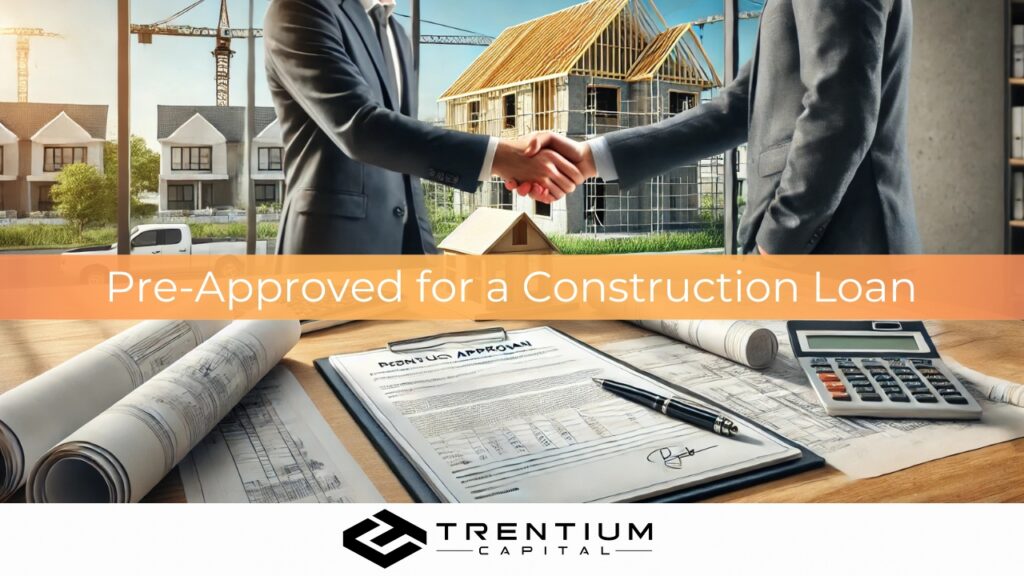Are you considering constructing your dream home? Here’s a professional guide to securing pre-approval for a construction loan.
Building a home from the ground up is an exciting journey, but securing financing for the construction process can be challenging. Unlike traditional mortgages, construction loans require a different approval process. So, how do you get pre-approved for a construction loan? This guide will walk you through everything you need to know to secure funding for your dream project.
Step 1: Understand What a Construction Loan Is
A construction loan is a short-term financing option designed to cover the cost of building a home. Unlike a traditional mortgage that funds an existing property, a construction loan is disbursed in phases as construction progresses. Once the home is completed, the loan is typically converted into a permanent mortgage.
Construction loans generally have higher interest rates than traditional mortgages due to their short-term nature and the risks involved in home construction. These loans often require a more stringent approval process, including thorough reviews of your creditworthiness, contractor qualifications, and detailed construction plans.
There are different types of construction loans, including:
- Construction-to-permanent loans automatically convert into a standard mortgage once construction is completed, simplifying the process.
- Stand-Alone Construction Loans: These cover only the construction phase, requiring you to secure a separate mortgage once the home is built.
- Owner-Builder Loans: These loans are for individuals who plan to act as their own general contractors rather than hire a professional builder.
Understanding which type of loan suits your needs is crucial before proceeding with the pre-approval process.
Step 2: Check Your Credit Score & Financial Standing
Lenders require a solid financial profile for construction loan approval. Before applying, it is essential to assess your financial health thoroughly. Lenders evaluate several key aspects to determine your eligibility and interest rate.
Check Your Credit Score:
A score of 680 or higher significantly improves your chances of approval. A higher score demonstrates financial responsibility and may help you secure a lower interest rate. If your score is below 680, consider paying down debts, making timely payments, and avoiding new credit inquiries to boost your score before applying.
Assess Your Debt-to-Income (DTI) Ratio:
Lenders prefer a DTI ratio below 45%, meaning your monthly debt obligations should not exceed 45% of your gross monthly income. A lower DTI indicates strong financial health and increases your likelihood of loan approval. To improve your DTI, consider reducing outstanding debts, increasing income, or consolidating loans to lower monthly obligations.
Ensure Stable Income:
Consistent employment history and verifiable income are crucial factors for lenders. Most lenders require at least two years of stable income, whether from salaried employment or self-employment. If self-employed, be prepared to provide additional documentation such as tax returns, profit-and-loss statements, and business financials. A reliable income stream reassures lenders that you can manage construction loan payments without financial strain.
Additionally, maintaining healthy savings is beneficial. Lenders often require borrowers to have sufficient cash reserves to cover unexpected construction costs or potential delays. A strong financial foundation improves loan approval prospects and ensures a smooth home-building process.

Step 3: Gather Necessary Documents
Being prepared with the right paperwork can speed up pre-approval and demonstrate to lenders that you are a reliable borrower. Proper documentation helps verify the financial stability and feasibility of your construction project. You’ll need:
- Proof of income: Pay stubs, tax returns, W-2s, or 1099s to confirm a steady income stream. Lenders want to ensure you have the financial means to meet repayment obligations.
- Bank statements and asset documentation: These help prove you have sufficient reserves for down payments and construction costs.
- A detailed construction plan, including estimated costs: Lenders require an itemized budget breakdown to assess the project’s viability. Your plan should include materials, labor costs, permits, and contingency reserves.
- Builder contracts and licensing details: Working with a licensed and reputable builder increases your chances of approval. Lenders will verify the builder’s experience, qualifications, and financial stability.
- Project timeline and construction schedule: A realistic timeline helps lenders determine the loan’s expected duration and funds’ disbursement.
- Property deed or land ownership documents: Lenders need proof of ownership if you already own the land. If purchasing land, they will review the agreement to ensure compliance with loan terms.
Having these documents readily available will expedite your pre-approval process and give lenders confidence in your ability to complete the project successfully.
Step 4: Find the Right Lender
Not all lenders offer construction loans, so it’s important to find one with experience in construction financing. A lender with expertise in construction loans can provide valuable guidance and flexible financing options to meet your needs. Compare interest rates, loan terms, and lender requirements before deciding to ensure you are getting the best deal.
Trentium Capital is the best source for loans for your project. They offer tailored financing solutions to make your home construction process seamless and efficient. Their industry expertise and commitment to customer satisfaction make them an excellent choice for securing your construction loan.
Step 5: Get a Builder Approval & Construction Plan Review
Lenders will require details about the builder you choose, including their experience, licensing, and financial stability. Working with a reputable, licensed, and insured builder increases your chances of loan approval, as lenders want assurance that the project will be completed on time and within budget. Be prepared to provide references, previous project portfolios, and financial statements for your builder.
Additionally, you’ll need to submit a comprehensive construction plan that outlines:
- Project timeline: A well-structured timeline helps lenders assess the feasibility of the construction process. Delays can affect loan disbursement, so ensure realistic deadlines are set.
- Budget estimates: A detailed budget breakdown, including labor, materials, permits, and contingencies, provides a clear financial outlook for lenders.
- Building specifications: Architectural drawings, floor plans, and material lists offer lenders a complete picture of the project’s scope and execution.
- Land purchase details (if applicable): If the land is not already owned, lenders will review the purchase agreement and ensure it meets loan requirements.
Thoroughly preparing these documents can help streamline the approval process and prevent unexpected delays or rejections.
Step 6: Submit Your Loan Application
Once you’ve prepared your documents and selected a lender, it’s time to apply. During this stage:
- Expect a thorough financial review.
- Be ready for an appraisal of the proposed project.
- Allow time for underwriting and final loan approval.
FAQs About Getting Pre-Approved for a Construction Loan
1. How long does it take to get pre-approved for a construction loan? The process can take 2-6 weeks, depending on the lender and how quickly you submit the required documents.
2. Do I need a down payment for a construction loan?
Yes, most lenders require at least 20-30% down due to the higher risk associated with construction loans.
3. Can I use a construction loan for renovations?
Yes, some construction loans, like renovation loans, can be used for extensive home improvements.
4. What Comes Next After Construction Loan Approval?
Funds are disbursed in phases as construction milestones are completed. After construction is finished, the loan typically converts into a traditional mortgage.
5. What if my construction project exceeds the budget?
Having contingency funds is crucial, as lenders won’t typically increase loan amounts once construction begins.
Get Construction Loan with Trentium Capital!
Ready to turn your dream home into reality? Trentium Capital offers expert guidance and flexible construction loan options to make your project successful. Contact us today and take the first step toward building your future!



